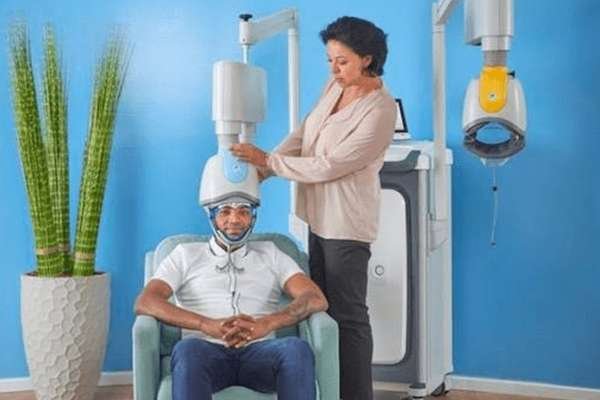Best Affordable Psychiatrist Clinic for Brain Stroke Treatment in Gurugram at Positive Mind Care
A brain stroke occurs when the blood supply to part of the brain is interrupted...

Positive Mind Care and Research Centre is a leading mental health care facility of Delhi – NCR, dedicated to helping individuals to overcome Major Depressive Disorder and reclaim their joyful lives through a unique breakthrough technology called Deep Transcranial Magnetic Stimulation (Deep TMS), which can reach significant depth and breadth of the brain and produce broad stimulation and functional modulation of targeted brain areas to help treat MDD.
Deep TMS treatment features unique, patented coils that are fitted into a helmet, which is secured snugly to the patient’s head during the treatment. We are using BrainsWay’s therapy, which has been utilized in over 60 clinical trials worldwide. The company’s device has been FDA approved for the treatment of Major Depressive Disorder (MDD) since 2013, FDA cleared (De-Novo) for the treatment of Obsessive Compulsive Disorder (OCD) since 2018, FDA cleared as an aid for short-term Smoking Cessation since 2020, and has now received an expanded indication for Anxious Depression.
Parkinson’s disease is a progressive neurological disorder that primarily affects movement. It is characterized by the gradual degeneration and loss of dopamine-producing neurons in the brain. Dopamine is a neurotransmitter responsible for transmitting signals that regulate movement and coordination.
The exact cause of Parkinson’s disease is not fully understood, but it is believed to involve a combination of genetic and environmental factors. It predominantly affects people over the age of 60, but early-onset cases can occur in younger individuals.
While there is currently no cure for Parkinson’s disease, treatment aims to manage symptoms and improve quality of life. Medications, physical therapy, and lifestyle adjustments can help control motor symptoms and provide relief from non-motor symptoms. In some cases, deep brain stimulation (DBS) surgery may be considered to help manage certain symptoms.
Parkinson’s disease is a chronic condition, and its progression varies from person to person. With appropriate medical care and support, many individuals with Parkinson’s disease can maintain a reasonable quality of life and continue to engage in daily activities for an extended period. Regular follow-up with a neurologist or movement disorder specialist is crucial to monitor and manage the condition effectively.
Around 10 million people suffer from Parkinson’s Disease globally.

The symptoms of Parkinson’s disease can vary from person to person and often develop gradually over time. The primary symptoms are related to movement and are caused by the progressive degeneration of dopamine-producing neurons in the brain.
Tremors: Involuntary shaking, usually starting in one hand or finger. Tremors are often more noticeable at rest and can lessen during movement.
Bradykinesia: Slowness of movement, making simple tasks more time-consuming. This can result in reduced arm swing while walking, difficulty initiating movement, and a general slowness in daily activities.
Rigidity: Stiffness and resistance in muscles, leading to reduced flexibility and movement. Muscles may feel tense and rigid, particularly in the arms, legs, neck, or trunk.
Postural instability: Difficulty maintaining balance and an increased risk of falls. Individuals with Parkinson’s disease may have a stooped posture and may experience difficulties in maintaining balance when standing or walking.
It’s important to note that not everyone with Parkinson’s disease will experience all of these symptoms, and the severity of the symptoms can vary widely among individuals. Early diagnosis and appropriate medical care, often involving a neurologist or movement disorder specialist, can help manage symptoms and improve the quality of life for people with Parkinson’s disease. Treatment may include medications, physical therapy, lifestyle adjustments, and in some cases, deep brain stimulation (DBS) surgery to manage certain symptoms.

Provides a convenient and flexible approach to treatment, allowing patients to receive care while maintaining their daily routines.
A non-invasive procedure that targets specific areas of the brain associated with depression. This innovative treatment option has shown promising results in reducing symptoms of MDD and is FDA approved.
A supportive and empathetic environment to express thoughts, emotions, and experiences, develop coping strategies, and gain insights to improve overall well-being.
Our center combines expert medical care with a compassionate and supportive environment, empowering individuals to reclaim their lives.
Cultivate awareness, reduce stress, and enhance overall well-being through meditation, yoga, and other practices to keep you grounded.
Our center combines expert medical care with a compassionate and supportive environment, empowering individuals to reclaim their lives.
Deep Transcranial Magnetic Stimulation (Deep TMS) is a non-invasive brain stimulation technique that has been studied as a potential treatment for various neuropsychiatric conditions, including smoking addiction. While the research in this area is still ongoing, Deep TMS has shown some promising results in helping individuals with smoking addiction. Here’s how Deep TMS may help in treating smoking addiction:
We at Positive Mind Care and Research Centre, a new generation mental health clinic, are dedicated to providing the highest quality care and research in the field of mental health. We take a positive and holistic approach to mental health, focusing on the individual as a whole and their unique needs and circumstances. We are committed to using evidence-based scientific treatment methods, conducting research, and providing education and outreach to the community. Remember that you are not alone, and we are here to help you on your journey towards betterment!
A brain stroke occurs when the blood supply to part of the brain is interrupted...
Addiction is a serious and life-altering condition that can disrupt both the personal and professional...
Anxiety is a common mental health issue affecting millions of individuals globally. It manifests in...
Learn more about how Positive Mind Care innovative TMS treatment technology can be effective in treating psychiatric disorders.
Learn more about how DEEP TMS treatment technology can be effective in treating neurological disorders.
Disclaimer:- The information provided on this website is for informational & educational purposes only and should not replace professional medical advice. Please consult with a qualified healthcare provider for personalized treatment recommendations.
Copyright © 2023. Positive Mind Care. All Rights Reserved